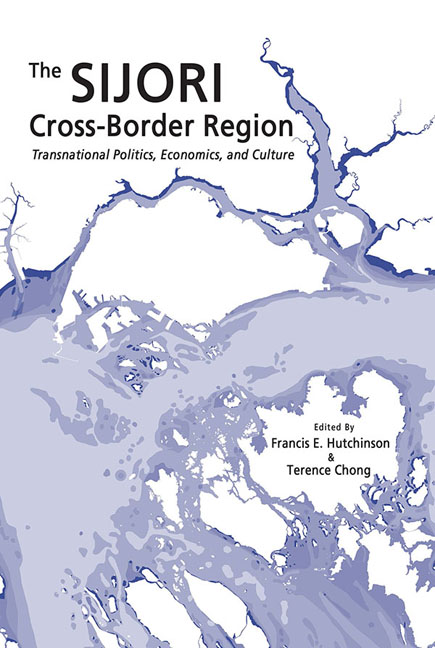Book contents
- Frontmatter
- Contents
- List of Maps
- List of Tables
- List of Figures
- Foreword
- Acknowledgements
- Contributors
- Abbreviations
- Introduction
- Section I Understanding the Whole
- Map2
- 2 The Population of the SIJORI Cross-Border Region
- 3 The SIJORI Cross-Border Region as an Economic Entity in 1990 and 2012, and Perspectives for 2030
- Section II Policy and Politics
- Section III Cross-Border Social and Cultural Communities
- Section IV Formal and Informal Economies
- Conclusion
- Appendix
- Sources for the SIJORI Maps
- Index
3 - The SIJORI Cross-Border Region as an Economic Entity in 1990 and 2012, and Perspectives for 2030
from Section I - Understanding the Whole
Published online by Cambridge University Press: 22 July 2017
- Frontmatter
- Contents
- List of Maps
- List of Tables
- List of Figures
- Foreword
- Acknowledgements
- Contributors
- Abbreviations
- Introduction
- Section I Understanding the Whole
- Map2
- 2 The Population of the SIJORI Cross-Border Region
- 3 The SIJORI Cross-Border Region as an Economic Entity in 1990 and 2012, and Perspectives for 2030
- Section II Policy and Politics
- Section III Cross-Border Social and Cultural Communities
- Section IV Formal and Informal Economies
- Conclusion
- Appendix
- Sources for the SIJORI Maps
- Index
Summary
INTRODUCTION
Regional cross-border economic cooperation to boost economic growth is not new to Southeast Asia. Since the late 1980s, policymakers in Singapore, Johor, and the Riau Islands have attempted, at different times, to leverage their different attributes in a coordinated fashion. The close proximity of Singapore with the Malaysian state of Johor to the north, and the Riau Islands in Indonesia to the south captured the imagination of politicians and economic decision-makers, prompting initiatives to “knit” the three territories into a “growth triangle” to catalyse development in the region. Despite its compelling business argument, the concept has had intermittent levels of support, depending on the internal dynamics of the three countries.
The idea of the growth triangle was initially put forward by then Deputy Prime Minister Goh Chok Tong in 1989 and was subsequently endorsed by the leaders of Singapore, Malaysia, and Indonesia in 1990. Since then, there have been several moves to increase cooperation. Thus, an agreement for economic cooperation between Singapore and Indonesia on the joint development of the whole of Riau province was signed on 28 August 1990. A joint Indonesia-Singapore investmentpromotion mission to Tokyo and Osaka to promote the economic heartland of the Riau Islands, Batam, was also undertaken in December 1990. However, interest in the growth triangle waned somewhat in the wake of the Asian Financial Crisis. And despite the desire to intensify cooperation and deepen the linkages between the three territories, as expressed by political leaders of the three countries, little of substance was achieved.
This indifferent progress has often been attributed to domestic politics and other national priorities. Furthermore, there has also been an element of unfortunate timing, as the three countries concerned have rarely promoted SIJORI at the same time. While Singapore has consistently sought to promote cross-border linkages as a means of escaping its land- and labour-scarce economy, political and economic priorities in the neighbouring countries have been more varied.
In the late 1990s, the Indonesians were quite keen in promoting the BBK islands (Batam, Bintan and Karimun) in Riau as a catalyst to revive the economy following the Asian Financial Crisis. Thus, the national government went as far as to have BBK designated as a special economic zone. However, that idea did not receive equivocal support in the House of Representatives.
- Type
- Chapter
- Information
- The SIJORI Cross-Border RegionTransnational Politics, Economics, and Culture, pp. 66 - 94Publisher: ISEAS–Yusof Ishak InstitutePrint publication year: 2016

